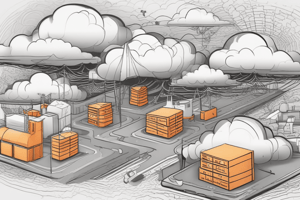Podcast
Questions and Answers
What is a key advantage of using serverless compute in AWS over server compute?
What is a key advantage of using serverless compute in AWS over server compute?
- You can run applications with fixed server capacities.
- You must manage all instances manually.
- You have complete control over the underlying servers.
- You pay for the runtime of your application only when it is in use. (correct)
Which instance type is best suited for applications that require high CPU performance?
Which instance type is best suited for applications that require high CPU performance?
- Memory Optimized
- General Purpose
- Storage Optimized
- Compute Optimized (correct)
In which scenario is Auto Scaling particularly beneficial?
In which scenario is Auto Scaling particularly beneficial?
- When using a single EC2 instance for an application.
- When running a batch job that needs a fixed number of instances.
- For workloads with fluctuating traffic demands. (correct)
- When hosting a static website with consistent traffic.
What is a primary function of an Elastic Load Balancer?
What is a primary function of an Elastic Load Balancer?
Which of the following is NOT a type of EC2 instance?
Which of the following is NOT a type of EC2 instance?
How does a pay-as-you-go pricing model benefit AWS EC2 users?
How does a pay-as-you-go pricing model benefit AWS EC2 users?
When would you choose to use a GPU instance in AWS?
When would you choose to use a GPU instance in AWS?
What is a common use case for the Application Load Balancer (ALB)?
What is a common use case for the Application Load Balancer (ALB)?
What does the 'Memory Optimized' EC2 instance family primarily offer?
What does the 'Memory Optimized' EC2 instance family primarily offer?
What is the primary function of a Network Load Balancer (NLB)?
What is the primary function of a Network Load Balancer (NLB)?
When should you choose AWS Fargate over AWS Lambda?
When should you choose AWS Fargate over AWS Lambda?
Which AWS service is best suited for deploying Kubernetes-managed containers?
Which AWS service is best suited for deploying Kubernetes-managed containers?
What is one of the key benefits of using AWS Lambda?
What is one of the key benefits of using AWS Lambda?
In which scenario is it recommended to use Amazon ECS?
In which scenario is it recommended to use Amazon ECS?
How does AWS Auto Scaling enhance an application’s performance during high demand?
How does AWS Auto Scaling enhance an application’s performance during high demand?
What distinguishes AWS Elastic Container Service (ECS) from AWS Elastic Kubernetes Service (EKS)?
What distinguishes AWS Elastic Container Service (ECS) from AWS Elastic Kubernetes Service (EKS)?
Which option is NOT a characteristic of EC2 instances?
Which option is NOT a characteristic of EC2 instances?
What is a common use case for implementing AWS Lambda?
What is a common use case for implementing AWS Lambda?
What key aspect differentiates AWS Fargate from traditional container services?
What key aspect differentiates AWS Fargate from traditional container services?
Flashcards
EC2 (Elastic Compute Cloud)
EC2 (Elastic Compute Cloud)
Provides virtual servers (instances) to run applications in the cloud.
Server Compute
Server Compute
You manage your servers (e.g., EC2 instances). Pay for running instances, even if idle.
Compute Optimized EC2 Instance
Compute Optimized EC2 Instance
High-performance processors for CPU-intensive tasks. Example: Machine learning.
Auto Scaling (Provides elasticity)
Auto Scaling (Provides elasticity)
Signup and view all the flashcards
General Purpose EC2 Instance
General Purpose EC2 Instance
Signup and view all the flashcards
Memory Optimized EC2 Instance
Memory Optimized EC2 Instance
Signup and view all the flashcards
Storage Optimized EC2 Instance
Storage Optimized EC2 Instance
Signup and view all the flashcards
GPU Optimized EC2 Instance
GPU Optimized EC2 Instance
Signup and view all the flashcards
When to Use EC2?
When to Use EC2?
Signup and view all the flashcards
Network Load Balancer (NLB)
Network Load Balancer (NLB)
Signup and view all the flashcards
When to Use Auto Scaling?
When to Use Auto Scaling?
Signup and view all the flashcards
Elastic Load Balancers (ELB)
Elastic Load Balancers (ELB)
Signup and view all the flashcards
Types of Load Balancers
Types of Load Balancers
Signup and view all the flashcards
AWS Fargate
AWS Fargate
Signup and view all the flashcards
Amazon EKS (Elastic Kubernetes Service)
Amazon EKS (Elastic Kubernetes Service)
Signup and view all the flashcards
What are the Container Services in AWS?
What are the Container Services in AWS?
Signup and view all the flashcards
Types of Container Services in AWS
Types of Container Services in AWS
Signup and view all the flashcards
Application Load Balancer (ALB)
Application Load Balancer (ALB)
Signup and view all the flashcards
Amazon ECS (Elastic Container Service)
Amazon ECS (Elastic Container Service)
Signup and view all the flashcards
Serverless Compute
Serverless Compute
Signup and view all the flashcards
Classic Load Balancer (CLB)
Classic Load Balancer (CLB)
Signup and view all the flashcards
EC2 Instance Types
EC2 Instance Types
Signup and view all the flashcards
AWS Lambda
AWS Lambda
Signup and view all the flashcards
When to use Amazon EKS (Elastic Kubernetes Service) over Amazon ECS (Elastic Container Service)?
When to use Amazon EKS (Elastic Kubernetes Service) over Amazon ECS (Elastic Container Service)?
Signup and view all the flashcards
When to use AWS Fargate over Amazon EKS (Elastic Kubernetes Service) and Amazon ECS (Elastic Container Service)?
When to use AWS Fargate over Amazon EKS (Elastic Kubernetes Service) and Amazon ECS (Elastic Container Service)?
Signup and view all the flashcards
Study Notes
AWS Compute Services Overview
- AWS provides compute services for running applications and workloads, offering flexibility, scalability and efficiency.
Amazon EC2 (Elastic Compute Cloud)
-
EC2 provides virtual servers (instances) for running applications in the cloud.
-
Instance types vary based on needs (CPU, memory, storage).
-
Pricing is pay-as-you-go: pay only for instance usage.
- General Purpose: Balanced for CPU, memory and networking; suitable for web servers (t3, m5 families).
- Compute Optimized: High-performance processors for CPU-intensive tasks (like machine learning) (c5 family).
- Memory Optimized: More memory for large datasets or in-memory databases (r5 family).
- Storage Optimized: Optimized for high-speed or large storage needs (i3 family).
- GPU Instances: Accelerate tasks like deep learning (p3 family).
-
EC2 is best for applications needing full control over virtual machines.
Auto Scaling
- Auto Scaling automatically adjusts the number of EC2 instances based on demand.
- Maintains high availability and saves costs.
- Suitable for fluctuating workloads (like e-commerce during sales).
Elastic Load Balancers (ELB)
-
Load Balancers distribute incoming traffic across multiple servers (e.g., EC2 instances).
-
Keeps applications available and handles large traffic.
- Application Load Balancer (ALB): Works at the application layer (HTTP/HTTPS), routing traffic based on URLs.
- Network Load Balancer (NLB): Works at the network layer (TCP/UDP), ideal for high-performance, low-latency traffic.
- Classic Load Balancer (CLB): A legacy option for basic load balancing.
-
ELBs are crucial for distributing traffic for high availability and performance.
Container Services
-
AWS offers services to manage and deploy containerized applications.
- Amazon ECS (Elastic Container Service): Fully managed container orchestration for Docker containers.
- Amazon EKS (Elastic Kubernetes Service): Managed Kubernetes service for container orchestration (advanced scaling and deployment).
- AWS Fargate: Serverless compute engine for running containers without managing servers.
-
ECS is suitable for simpler container needs, EKS offers advanced Kubernetes management, and Fargate avoids server management.
Serverless Compute
-
AWS serverless compute (no infrastructure management) options:
- AWS Lambda: Executes code in response to events (like HTTP requests), paying only for used compute time.
- AWS Fargate: Runs containers without server management.
-
Lambda is best for event-driven applications, while Fargate handles container workloads without infrastructure management.
Key Differences Between Compute Options
- A summarized comparison of compute services highlighting their key benefits and best use cases. (See table in original text).
Real-World Scenarios
- E-commerce: Use EC2, Auto Scaling, and ELB to handle fluctuating traffic.
- Microservices: Use ECS or EKS for container orchestration.
- Weather App: Use AWS Lambda for hourly scheduled data updates.
Key Takeaways
- Choose EC2 instance types based on workload requirements.
- Auto Scaling adjusts resources automatically.
- Load Balancers distribute traffic efficiently.
- Choose container services (ECS, EKS, Fargate) based on needs.
- Serverless options (Lambda, Fargate) are suitable for applications without infrastructure management.
Studying That Suits You
Use AI to generate personalized quizzes and flashcards to suit your learning preferences.




